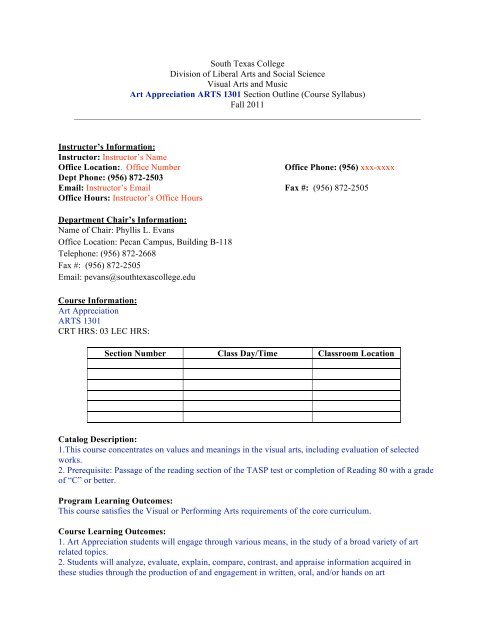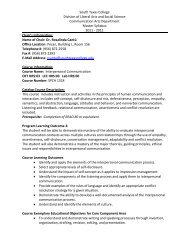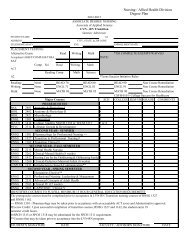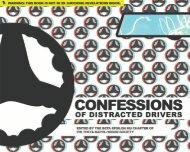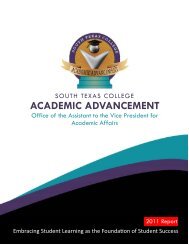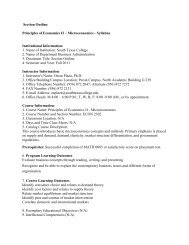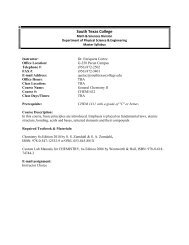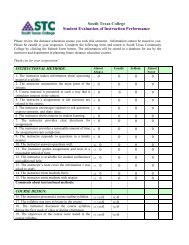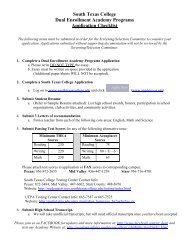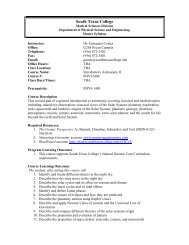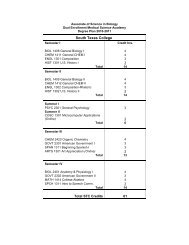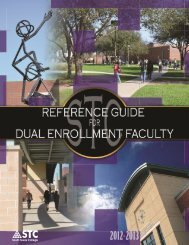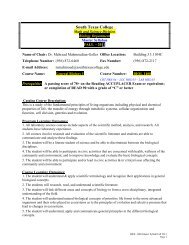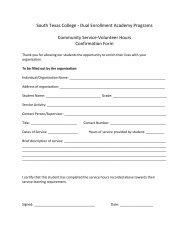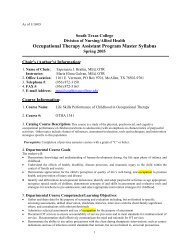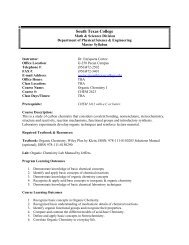Art Appreciation - South Texas College
Art Appreciation - South Texas College
Art Appreciation - South Texas College
You also want an ePaper? Increase the reach of your titles
YUMPU automatically turns print PDFs into web optimized ePapers that Google loves.
<strong>South</strong> <strong>Texas</strong> <strong>College</strong><br />
Division of Liberal <strong>Art</strong>s and Social Science<br />
Visual <strong>Art</strong>s and Music<br />
<strong>Art</strong> <strong>Appreciation</strong> ARTS 1301 Section Outline (Course Syllabus)<br />
Fall 2011<br />
______________________________________________________________________________<br />
Instructor’s Information:<br />
Instructor: Instructor’s Name<br />
Office Location:. Office Number<br />
Office Phone: (956) xxx-xxxx<br />
Dept Phone: (956) 872-2503<br />
Email: Instructor’s Email Fax #: (956) 872-2505<br />
Office Hours: Instructor’s Office Hours<br />
Department Chair’s Information:<br />
Name of Chair: Phyllis L. Evans<br />
Office Location: Pecan Campus, Building B-118<br />
Telephone: (956) 872-2668<br />
Fax #: (956) 872-2505<br />
Email: pevans@southtexascollege.edu<br />
Course Information:<br />
<strong>Art</strong> <strong>Appreciation</strong><br />
ARTS 1301<br />
CRT HRS: 03 LEC HRS:<br />
Section Number Class Day/Time Classroom Location<br />
Catalog Description:<br />
1.This course concentrates on values and meanings in the visual arts, including evaluation of selected<br />
works.<br />
2. Prerequisite: Passage of the reading section of the TASP test or completion of Reading 80 with a grade<br />
of “C” or better.<br />
Program Learning Outcomes:<br />
This course satisfies the Visual or Performing <strong>Art</strong>s requirements of the core curriculum.<br />
Course Learning Outcomes:<br />
1. <strong>Art</strong> <strong>Appreciation</strong> students will engage through various means, in the study of a broad variety of art<br />
related topics.<br />
2. Students will analyze, evaluate, explain, compare, contrast, and appraise information acquired in<br />
these studies through the production of and engagement in written, oral, and/or hands on art
projects.<br />
3. Through written, oral, experiential, and hands-on projects and activities, students will analyze,<br />
evaluate, explain, compare, contrast, and appraise major monuments according to stylistic and other<br />
formal criteria, and as reflections of the social structures in which they were produced and the<br />
relationship of the arts to society.<br />
4. Students will demonstrate their informed comprehension of the formal aspects of a work of art<br />
including the elements and principles of design. Students will utilize critical thinking skills to<br />
synthesize an objective evaluation with subjective criticism of the art form in an articulate personal<br />
reaction to the work of art. This will involve analysis, evaluation, explanation, comparison, contrasting,<br />
and appraisal of information acquired on the students’ behalf through the production and<br />
engagement in written, oral, and/or hands on art projects.<br />
5. By the end of the term, students will possess a working knowledge of basic art terminology, and<br />
have the ability to analyze works in terms of the intent, purpose, function, and formal aspects. To<br />
demonstrate this working knowledge, students will analyze, evaluate, explain, compare, contrast and<br />
appraise information acquired in these studies through the production of and engagement in written,<br />
oral, and/or hands on art projects.<br />
Departmental Outcomes for Visual <strong>Art</strong>s Courses<br />
•Understand the relationship of the arts to society.<br />
•Understand the different types of visual arts and genres.<br />
•Understand the individuals and their roles in producing fine art.<br />
•Understand the value of arts to help maintain a balance in thought (arts vs. science).<br />
Exemplary Educational Objectives for Core Humanities and Visual and Performing <strong>Art</strong>s<br />
Component of the Core Curriculum<br />
•To demonstrate awareness of the scope and variety of works in the arts and humanities.<br />
•To understand those works as expressions of individual and human values within an historical<br />
And social context.<br />
•To respond critically to works in the arts and humanities.<br />
•To engage in the creative process or interpretive performance and comprehend the physical<br />
and intellectual demands required of the author or visual or performing artist.<br />
•To articulate an informed personal reaction to works in the arts and humanities.<br />
•To develop an appreciation for the aesthetic principles that guide or govern the humanities<br />
and arts.<br />
•To demonstrate knowledge of the influence of literature, philosophy, and/or the arts on<br />
intercultural experiences.<br />
Intellectual Competencies<br />
•READING: Class assignments will include readings from a variety of printed materials such as books,<br />
text, journals, newspapers, and/or other sources of written information. Through these readings, students<br />
will analyze the written material as it pertains to the disciplines of Visual <strong>Art</strong>s and/or Music.<br />
•WRITING: Class assignments will include writing critiques, reaction papers, and/or<br />
research reports. Through these writings students will produce clear, correct, and coherent prose as it<br />
pertains to the disciplines of Visual <strong>Art</strong>s and Music. In the practice and reflection required for these<br />
writings, students will discover a topic, and develop and organize it effectively for an appropriate Visual<br />
<strong>Art</strong>s and/or Music Audience.<br />
•COMPUTER LITERACY: Students will be required to research topics via the Internet and write reports
using a word-processing program. They may also be required to utilize PowerPoint, or other graphics<br />
program in order to develop computer literacy as it pertains to the disciplines of Visual <strong>Art</strong>s and/or Music.<br />
•SPEAKING: Class assignments will include speaking presentations and small group<br />
discussion. Through critiques, formal oral presentations, and/or informal group discussions, students will<br />
communicate orally in clear, coherent, and persuasive language as it pertains to the disciplines of Visual<br />
<strong>Art</strong>s and/or Music.<br />
•LISTENING: Students will be expected to analyze and interpret various forms of spoken, artistic, and/or<br />
musical communication. Students may be asked to listen to lectures, guest speakers, media presentations,<br />
musical and artistic sound arrangements, and/or other forms of auditory communication. Class<br />
assignments will include quizzes, exams, and/or reaction papers to assess the students’ skills in listening<br />
as it pertains to the disciplines of Visual <strong>Art</strong>s and/or Music.<br />
•CRITICAL THINKING: Students are asked to solve problems creatively, make value judgments and/or<br />
evaluate aesthetic experiences as they pertain to the disciplines of Visual <strong>Art</strong>s and/or Music. Various<br />
forms of assessment, such as written reactions to artistic and/or musical productions, creation of artistic<br />
works in which a creative solution is found to a specific problem, and/or the performance or creation of a<br />
musical piece will be used to encourage critical thinking and analysis.<br />
Perspectives<br />
•The subject of cultural/gender relations will be taught and through lectures, assignments, and group<br />
discussions. Students will learn and understand their relationship to the larger world and the<br />
responsibilities of living in a culturally and ethnically diversified world as they pertain to the disciplines<br />
of Visual <strong>Art</strong>s and/or Music. This complies with Perspective 1 of the <strong>South</strong> <strong>Texas</strong> <strong>College</strong> Institutional<br />
Effectiveness Plan: “Establish broad and multiple perspectives on the individual in relationship to the<br />
larger society and world in which he or she lives, and to understand the responsibilities of living in a<br />
culturally and ethnically diversified world.”<br />
•Lectures, assignments, and group discussions will stimulate a capacity to discuss and reflect upon<br />
individual, political, economic, and social aspects of life as they pertain to the disciplines of Visual <strong>Art</strong>s<br />
and/or Music in order to understand ways in which to be a responsible member of society. This complies<br />
with Perspective 2 of the <strong>South</strong> <strong>Texas</strong> <strong>College</strong> Institutional Effectiveness Plan: “Stimulate a capacity to<br />
discuss and reflect upon individual, political, economic, and social aspects of life in order to understand<br />
ways in which to be a responsible member of society.”<br />
•Deadlines for assignments and attendance policies will be strictly enforced to encourage<br />
students to actively participate and maintain a sense of personal responsibility. This also complies with<br />
Perspective 2 of the <strong>South</strong> <strong>Texas</strong> <strong>College</strong> Institutional Effectiveness Plan (as defined above).<br />
•Students will use computers in research of topics. Through lectures, assignments, and group discussions<br />
will become aware of the advances in computer-mediated arts and/or music, and the role technology has<br />
taken in expanding the arts and/or musical media. This complies with Perspective 4 of the <strong>South</strong> <strong>Texas</strong><br />
<strong>College</strong> Institutional Effectiveness Plan: “Develop a capacity to use knowledge of how technology and<br />
science affect their lives.<br />
•Students will demonstrate ethical behavior through active group participation, avoidance of plagiarism<br />
and cheating by copying and/or distributing other students’ work or instructors’ exams and assignments.
Other discussions of ethics may be discussed as they pertain to the disciplines of Visual <strong>Art</strong>s and/or<br />
Music. This complies with Perspective 5 of the <strong>South</strong> <strong>Texas</strong> <strong>College</strong> Institutional Effectiveness Plan:<br />
“Develop personal values for ethical behavior.<br />
•Through lectures, assignments, and group discussions, students will develop the ability to make aesthetic<br />
judgments as they pertain to the disciplines of Visual <strong>Art</strong>s and/or Music. This complies with Perspective 6<br />
of the <strong>South</strong> <strong>Texas</strong> <strong>College</strong> Institutional Effectiveness Plan: “Develop the ability to make aesthetic<br />
judgments.”<br />
•Through lectures, assignments, and group discussions, students will integrate knowledge and understand<br />
the interrelationships of the arts and/or music and all other scholarly disciplines. This complies with<br />
Perspective 8 of the <strong>South</strong> <strong>Texas</strong> <strong>College</strong> Institutional Effectiveness Plan: “Integrate knowledge and<br />
understand the interrelationships of the scholarly disciplines.”<br />
Instructor Outcomes<br />
Each instructor personalizes the content of his/her course here.<br />
Departmental Course Requirements:<br />
<strong>Art</strong> <strong>Appreciation</strong> students will engage through various means, in the study of a broad variety of art<br />
related topics. Through written, oral, experiential, and hands-on projects and activities, students will<br />
demonstrate their comprehension of the relationship of the arts to society. Similarly, students will<br />
demonstrate their informed comprehension of the formal aspects of a work of art including the<br />
elements and principles of design. Students will utilize critical thinking skills to synthesize an objective<br />
evaluation with subjective criticism of the art form in an articulate personal reaction to a work of art.<br />
Students will gain exposure to a broad variety of two-dimensional, three-dimensional and temporal<br />
(time-based) media and art genres, and will demonstrate, through various hands-on means, their<br />
comprehension of the physical demands that are required of a visual artist. Students will investigate<br />
specific artists who have shaped and influenced art and the events in science, philosophy, religion and<br />
history of each particular time and place that had an impact on the art of that era.<br />
Evaluation Methods and Grading Criteria:<br />
A combination of oral assignments, written assignments, in-class quizzes/examinations, oral<br />
presentations, and classroom activities can be used to evaluate student performance. Each instructor<br />
will have at his/her discretion, the ability to combine the admixture to evaluate student performance.<br />
Students may display their level of understanding of the learning outcomes in several manners.<br />
•Evaluation Method for Exemplary Educational Objectives<br />
Each instructor will evaluate Exemplary Educational Objectives by utilizing a combination of<br />
assignments including some or all but not limited to the following: oral assignments, written<br />
assignments, in-class quizzes/examinations, oral presentations/discussions, classroom activities,<br />
creative artistic/musical projects/performances. This will provide students with the opportunity to<br />
display their level of understanding of the learning outcomes in several manners.
•Grading Criteria<br />
Each instructor will have at his/her discretion the ability to combine the admixture to evaluate each<br />
student performance. Each instructor will have at his/her discretion the ability to apply grading criteria<br />
to the various assessment instruments as he/she sees fit.<br />
Academic Integrity<br />
Each instructor will explain his/her policies on academic integrity.<br />
From the Student Code of Conduct in the Student Handbook: Students attending <strong>South</strong> <strong>Texas</strong> <strong>College</strong> are<br />
responsible for adhering to standards of academic integrity. Academic integrity is the pursuit of scholarly<br />
activity in an open, honest and responsible manner. Academic integrity is a basic guiding principle for all<br />
academic activity at <strong>South</strong> <strong>Texas</strong> <strong>College</strong> and students are expected to act in accordance with this<br />
principle. Incidents involving academic dishonesty are typically handled by the course instructor or<br />
academic department. In some instances, cases involving academic dishonesty may be referred to the<br />
Director of Student Life, Site Coordinator or Coordinator for Judicial Affairs/Ombudsperson for<br />
adjudication. Types of academic dishonesty include, but are not limited to:<br />
a. Cheating<br />
• Copying from another student’s work.<br />
• Using or possessing materials not authorized by a testing proctor (such as lessons, books, notes,<br />
calculators, etc.).<br />
• Knowingly using or soliciting, in whole or part, the contents of an un-administered test.<br />
• Collaborating with or seeking aid from another student without authorization during a test.<br />
• Substituting for another person, or permitting another person to substitute for oneself, in taking a<br />
course test or completing any course-related assignment.<br />
• Using, buying, stealing, or transporting some or all of the contents of an un-administered test,<br />
homework answer sheet, or computer program.<br />
• Using, buying, stealing, transporting, or soliciting a test, test facsimile, answer key, or other<br />
written works.<br />
b. Plagiarism<br />
• The appropriation, buying, receiving as a gift, or obtaining by any means someone else’s work<br />
and then submitting that work for credit as if it were one’s own without appropriate<br />
acknowledgment to the author.<br />
c. Collusion<br />
• Unauthorized collaboration with another person in the preparation of an academic assignment<br />
offered for credit.<br />
Late Work<br />
Each instructor will explain his/her policies on the acceptance of late work/missed exams.<br />
Attendance Policy<br />
Each instructor will explain his/her policies on student attendance.<br />
Required Textbook & Resources:<br />
• World of <strong>Art</strong> 6/e. Henry M. Sayre. ISBN-13 978-0-205-67720-7. Pearson.<br />
•Supplies Needed: Each instructor will list additional required supplies/resources here or indicate that<br />
a complete list is attached to the syllabus.
Developmental Studies Policy Statement:<br />
The <strong>College</strong>’s Developmental Education Plan requires students who have not met the college-level<br />
placement standard on an approved assessment instrument in reading, writing, and/or mathematics to<br />
enroll in Developmental Studies courses including <strong>College</strong> Success. Failure to attend these required<br />
classes may result in the student's withdrawal from ALL college courses.<br />
Statement of Equal Opportunity: No person shall be excluded from participation in, denied the benefits<br />
of, or be subject to discrimination under any program or activity sponsored or conducted by <strong>South</strong> <strong>Texas</strong><br />
<strong>College</strong> on the basis of race, color, national origin, religion, sex, age, veteran status or disability.<br />
Alternative Format Statement: This document is available in an alternative format upon request by<br />
calling (956) 872-2503.<br />
ADA Statement: Individuals with disabilities requiring assistance or access to receive services should<br />
contact disABILITY Support Services at (956) 872-2173.
PROPOSED COURSE SCHEDULE:<br />
Each instructor will create a calendar or proposed weekly schedule here that indicates what topics,<br />
assignments, readings, assessments, etc. will be covered each week. This is a proposed schedule, which<br />
is subject to change.<br />
STUDENT ACKNOWLEDGEMENTS<br />
Acknowledgement, Assumption of Risk and Hold Harmless Agreement<br />
I am aware of the dangers associated with processes used in this class, and the possibility of<br />
injuries while using this facility. I agree to assume full responsibility for my own safety and the safety of<br />
my property while I am in this studio/classroom, shop and lab area, both indoor and outdoor.<br />
Additionally, I hereby state that I have been trained by the instructor, staff member or designated<br />
assistant in the correct use of the equipment I will be using while in this class, and in the proper use of<br />
safety equipment associated with the use of such equipment.<br />
I agree to follow all safety signs, warnings, and instructions given by the instructor, staff member<br />
or designated assistant. I agree to never remove or otherwise defeat the guards on any equipment, except<br />
with the full awareness and permission of the instructor.<br />
In consideration for being allowed to use the above mentioned facility and equipment, I hereby<br />
release and hold harmless <strong>South</strong> <strong>Texas</strong> <strong>College</strong>, its Board of Regents, officers, advisors, agents and<br />
employees of the <strong>Art</strong> Department from any and all liability due to injury arising or resulting from any act<br />
or omission, neglect, or otherwise of said <strong>South</strong> <strong>Texas</strong> <strong>College</strong> Board of Regents, officers, advisors,<br />
agents and employees of the <strong>Art</strong> Department, or any other person or other participant in said activity<br />
while using this studio/classroom, shop and lab area, both indoor and outdoor. The terms hereof shall<br />
also serve as a release and an assumption of risk for my heirs, executor and administrator, and for all<br />
members of my family and may be plead as a bar to litigation.<br />
I also agree to indemnify and hold <strong>South</strong> <strong>Texas</strong> <strong>College</strong>, its Board of Regents, and all of the<br />
college’s officers, advisors, agents and employees above mentioned, harmless from and against any and<br />
all damage to property which may occur while I am in this studio/classroom, shop and lab area, both<br />
indoor and outdoor.<br />
________________________________________________<br />
Student Signature<br />
_____________________________<br />
Date<br />
PHOTO RELEASE FORM/ACKNOWLEDGEMENT OF POLICY<br />
I have read and fully understand the policies outlined in the syllabus/course outline. I am fully aware of<br />
the grading criteria for this course, and I understand all policies pertaining to attendance, late work, and<br />
dishonesty.<br />
________________________________________________<br />
Student Signature<br />
_____________________________<br />
Date<br />
I understand that STC may use works produced in this class for gallery shows, in an online or printed<br />
gallery, or in department or college promotions. ____________(Initial Here).
I understand that my work will not be sold or offered for sale without my prior permission.<br />
____________(Initial Here).<br />
I understand that the ownership of all works produced in this class remain mine. ____________(Initial<br />
Here) .


